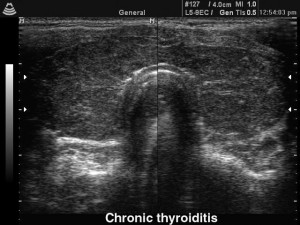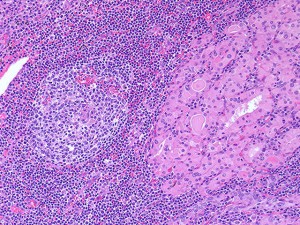Did you know that 1 out of every 13 individuals in the United States suffer from Thyroiditis? Read and know all about the types, causes, symptoms and treatment of this endocrine disorder.
What is Thyroiditis?
Page Contents
- 1 What is Thyroiditis?
- 2 Thyroiditis ICD9 Code
- 3 Thyroiditis Types
- 4 Thyroiditis Symptoms
- 5 Thyroiditis Causes
- 6 Thyroiditis Diagnosis
- 7 Thyroiditis Treatment
- 8 Thyroiditis Diet
- 9 Thyroiditis Home Treatment
- 10 Alternative Treatment for Thyroiditis
- 11 Thyroiditis Risk Factors
- 12 Thyroiditis Prognosis
- 13 Thyroiditis Complications
It is an endocrine disease characterized by a swelling of the thyroid gland. It is not a thyroid gland infection, as many like to believe, but only an inflammation.
Thyroiditis ICD9 Code
The ICD9 Code for this disease is 245.
Thyroiditis Types
The condition is differentiated into a number of types, such as:
Picture 1 – Thyroiditis
Hashimoto’s Thyroiditis
It is the most prevalent type of hypothyroidism in the United States. This autoimmune disorder is characterized by a thyroid gland inflammation that frequently leads to decreased thyroid functioning.
The disorder is also known by the name Chronic Thyroiditis.
Postpartum Thyroiditis
It commonly arises after pregnancy and may involve either Hypothyroidism or Hyperthyroidism or both – sequentially. It occurs in 5% of all women a year after giving birth.
Acute Thyroiditis
It is a very rare type of Thyroiditis and is marked by pain, inflammation and various other problems in the anterior part of the throat.
Subacute Thyroiditis
This form can result in both Hypothyroidism and Thyrotoxicosis. This rare disease can affect people of any age and sex.
Silent Thyroiditis
Also referred to as Painless Thyroiditis, it is more common in women and may arise at any age. Postpartum Thyroiditis is a variation of this disease that develops Postpartum.
Drug-induced Thyroiditis
As the name indicates, it occurs due to intake of drugs that are hazardous for health.
Radiation-induced Thyroiditis
It is a type of painful, acute thyroiditis that occurs due to radioactive therapy used for curing Hyperthyroidism. It may also result from use of radiation to cure cancerous conditions of the head and neck.
Riedel’s Thyroiditis
Also known as Riedel’s Trauma, this is a chronic an autoimmune variation of Thyroiditis. It is supposed to be a rare type of the disease that mostly affects women.
Thyroiditis Symptoms
The signs and symptoms of Thyroiditis tend to differ, based on the type of the condition that one is suffering from. The symptoms also depend on the rate of enlargement of the thyroid gland.
If the condition leads to a slow and chronic fast destruction or damage of thyroid cells, patients may suffer from symptoms similar to those of Hypothyroidism. In such cases, sufferers may experience problems like:
- Weight gain
- Constipation
- Fatigue
- Depression
- Dry Skin
- Poor tolerance to exercise
Such symptoms are usually common in sufferers of Hashimoto’s Thyroiditis.
If the condition results in rapid damage and destruction of thyroid cells, there can be a leakage of thyroid hormone stored within the gland. This can elevate the level of thyroid hormone in the bloodstream and give rise to problems similar to those of Hyperthyroidism. These involve:
- Anxiety
- Insomnia
- Palpitations
- Fatigue
- Weight loss
- Irritability
Such problems are seen to arise in patients affected with the toxic stage of painless, Subacute and Post-partum thyroiditis. Patients of Subacute thyroiditis can suffer from pain in the thyroid gland.
Generally, some problems are found to be common in most patients of this disease. These include:
- Rapid heartbeat
- Anxiety
- Slight nervousness
- Loss of around 5-10 pounds of weight
- Enhanced sweating
- Constipation
- Absence of hunger sensation
- Lethargy
- Lack of energy
- Moderate fever
- Cool, dry skin
- Reduced pulse rate, with less than 60 beats every minute
- Hoarseness
- Slow reflexes
- Inflammation around the eyes
- Firmness and enlargement of thyroid gland
Patients with subacute cases of the disorder usually suffer from pain in their thyroid gland.
Thyroiditis Causes
The disorder usually arises due to an attack on the thyroid gland by antibodies, due to a possible malfunction of the natural immune system of the body. It may also arise due to an infection of the gland caused by a microbe, such as a bacteria or virus, which can produce same effects as antibody attacks on the gland. Fever disorder may also cause this disease.
It can also occur as a side effect of usage of certain drugs, such as:
- Amiodarone
- Interferon-alpha
- Inter leukin-2
- Lithium
There can be possible damage of the thyroid cells due to usage of these medications.
Women who test positive for thyroid antibody during the first three months of their pregnancy have a 30 – 50% chance of developing this disorder during the postpartum period. Excessive intake of iodine may also contribute to thyroid conditions. In some cases, however, no identifiable cause can be found for this disease.
Thyroiditis Diagnosis
A physical examination can help detect enlargement of the thyroid gland and a possible Thyroiditis. The amount of thyroid hormones present in the bloodstream can be evaluated with the aid of Thyroid blood tests, such as:
- T3
- T4
- TSH (Thyroid Stimulating Hormone)
In some cases, thyroid scans may also be performed to probe the functioning of the thyroid gland in patients. A biopsy of the gland can help doctors understand the factors that might have resulted in the condition, such as an attack by antibodies. Diagnosis also helps detect the type of the disorder that the affected individual is having.
Thyroiditis Treatment
The disease is usually classified into three stages – overactive, underactive and return to normalcy. The type of treatment needed for this disease actually depends on the type and stage of it that one is diagnosed with.
Picture 2 – Thyroiditis Image
A patient exhibiting symptoms of hyperthyroidism may be prescribed with beta blockers which can help lower his or her heart rate. Such individuals may also be put through thyroid hormone replacement therapy, which helps restore hormone levels in the body and make metabolic activities more normal. This can help avoid further swelling of the thyroid gland.
Patients who suffer from throat ache due to a swollen gland are typically prescribed medicines to lower the painful symptoms. Acute cases of throat pain can be treated with the help of steroid therapy. The condition of Thyroiditis patients needs to be regularly examined to check the functioning of the thyroid gland.
Thyroiditis and Medications
The type of medicines used for treatment of this disorder actually depends on the form of Thyroiditis that a person is having. Some of the common medicines prescribed for this disorder include:
- Antibiotics
- Aspirin, to provide relief from pain and swelling
- Corticosteroid medications (such as Prednisone or Dexamethasone), to decrease swelling in acute cases
- Levothyroxine, in case of hypothyroidism or a large-sized goiter
- Propanolol, for curing Hyperthyroidism
- Short-term beta blockers, for relieving hyperthyroid symptoms
- Thyroxine, used in patients of hypothyroidism, to replace thyroid hormone
Thyroiditis and Surgery
Surgical treatment is rarely used for this disorder. In uncommon cases, however, partial thyroid removal may be done to ease pressure.
Thyroiditis Diet
A diet for patients of this disorder should be devoid of:
- Alcohol
- Caffeine
- Dairy products
- Refined foods
- Sugar
- Wheat
Patients taking thyroid medications should also consult their doctors before consuming foods or supplements containing iron or soy.
A diet recommended for such patients should include foods like:
- Beans
- Broccoli
- Brussels sprouts
- Cabbage
- Cauliflower
- Kale
- Mustard greens
- Soy
- Spinach
- Turnips
Such foods depress over activity of the thyroid glands. Hence, they are recommended for patients with hyperthyroid conditions. Those with hypothyroid conditions should avoid them. It is necessary to have such foods with caution as Thyroiditis sufferers tend to switch very quickly from hyper- to hypothyroidism.
Given below is a list of foods and supplements along with the quantity that a person should consume on a daily basis to have a normal metabolic function and proper thyroid hormone production.
- Essential fatty acids (1,000 – 1,500 mg, three times every day)
- Bromelain (250 – 500 mg 3 times per day between meals)
- Calcium (1,000 mg per day)
- Vitamin C (1,000 mg)
- Vitamin A (10,000 – 25,000 IU)
- Vitamin B complex [(50 -100 mg)
- Vitamin B2 (Riboflavin, 10 mg)
- Vitamin B3 (Niacin, 10 – 25 mg)
- Vitamin B6 (Pyridoxine, 5 – 15 mg)]
- Vitamin E (400 IU per day)
- Magnesium (200 – 600 mg per day)
- Selenium (200 mcg per day)
- Zinc (30 mg per day)
A physician may also recommend having particular nutritional supplements for a hypo- or hyperthyroid condition.
Thyroiditis Home Treatment
The home treatment for this disorder can be done with the aid of certain herbs. Herbal remedy is a safe and natural way to tone up and strengthen the body. As is the case with any therapy, it is advisable that you consult your physician before starting herbal treatment for this disease. This is particularly because some herbs tend to interact or interfere with certain drugs. The types of herbs that you should put to use should depend on the form of the condition that you are having.
In case of Hyperthyroid conditions, you may use:
- Bugleweed (Lycopus virginica)
- Lemon balm (Melissa officinalis)
- Motherwort (Leonurus cardiaca)
- Turmeric (Curcuma longa)
Hypothyroid patients may consider using:
- Coleus forskohlii (50 – 100 mg; 2 – 3 times per day)
- Guggul (Commiphora mikul) [25 mg for 3 times a day]
- Hawthorne (Crataegus monogyna) [500 mg for two times per day]
Alternative Treatment for Thyroiditis
The alternative cure for this disorder may involve:
Homeopathy
Although the potency of this type of treatment has not been medically reported, homeopathy may be effective as a supportive therapy for both hyperthyroidism and hypothyroidism.
Exercise
Regular workouts help improve functioning of the thyroid gland and can cure both hyperthyroidism and hypothyroidism.
Acupuncture
It may help address underlying excesses and deficiencies in thyroid hormone production and correct imbalances in the level of these hormones.
Massage
Therapeutic massage may provide patients with relief from stress and enhance the feeling of well being in sufferers.
However, such methods should only be used to support medical treatment and never be used alone as a remedial measure.
Thyroiditis Risk Factors
You are susceptible to this disorder if:
- You are a woman (women are more prone to this disorder than men)
- You have a personal or family history of the disease or any immune system disorder that heightens the risk of this condition
- You are taking certain medicines, such as Lithium or Amiodarone
- You are suffering or have recently suffered from any bacterial or viral ailment
- You have recently undergone Radiation therapy
- You are pregnant and within the first trimester period
Thyroiditis Prognosis
The outcome of this condition varies from one patient to another and depends on the type that one is having. In Acute cases of this disease, recovery is generally complete and the functioning of thyroid glands goes back to normal after treatment. In subacute cases, the condition may persist for 2-7 months. Patients may need inpatient care to complete approximately a fortnight of antibiotic course and also to recover from any surgical processes.
Thyroiditis Complications
In chronic autoimmune cases of the ailment, the main complication arises in the form of permanent hyperthyroidism. Around 20% children suffering from subclinical Hyperthyroidism enter remission and the condition becomes Euthyroidism.
Thyroiditis is a serious condition that can give rise to acute health problems, unless treated in time. Around 20-27 million individuals in the U.S are said to be suffering from problems of the thyroid gland, which might damage it permanently. If any of your family members or friends exhibit symptoms of this disease, immediately seek medical treatment from a professional healthcare provider. A physician, with necessary experience, can cure the condition very fast and prevent it from worsening.
References:
http://emedicine.medscape.com/article/925249-overview
http://www.medicinenet.com/thyroiditis/article.htm
http://www.umm.edu/altmed/articles/thyroiditis-000164.htm
http://www.endocrineweb.com/conditions/thyroid/thyroiditis



